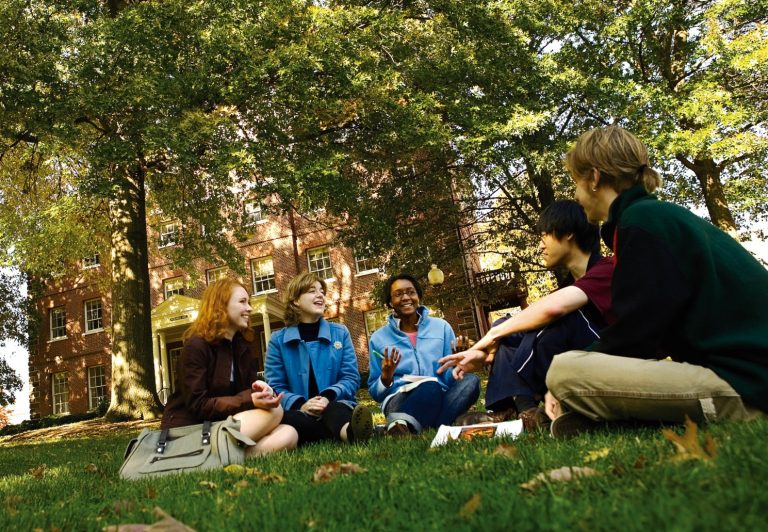
“The man who does not read good books has no advantage over the man who cannot read them.” – Mark Twain
According to the Organisation for Economic Co-operation and Development (OECD), reading for pleasure at the age of 15 is a powerful determiner of future social mobility. Not only does research suggest that those who read for sheer enjoyment show a deep-seated appetite to engage with stories and texts, it also shows that those with a predisposition for literature are instilled with a passion for lifelong learning that consequently leads to increased mobility.
With the expansive liberal arts at the core of its curriculum, St. John’s College provides interdisciplinary programs focused on the most important books and ideas of Western civilization. By immersing students in great texts and lively, unmediated conversation about the books and themselves, St. John’s produces students imbued with diverse social, cultural, and political perspectives – skills that prove invaluable in any real-world working environment. “The program demands extraordinary commitment, and St. John’s challenges students to widen their horizons, overcome their fears and even – in an era of hyper-partisan contentious discourse – change their minds,” says Mark Roosevelt, President of St. John’s College in Santa Fe.
“When a student comes to terms with nuance, ambiguity, and intellectual uncertainty – not to mention Ptolemy and Apollonius – she leaves college ready to navigate the challenges of modern life.”

Image courtesy of St. John’s College
From Shakespeare to Sophocles, Milton to Tolstoy, Austen to Hawthorne, Marx to Rousseau, and Hamilton to Twain; these readings form the backbone of St. Johns’ education. They instil students with both a creative and critical mindset, and inspire them to raise life’s most essential questions, all the while nurturing sustained, thoughtful discussion and urging contemplative inquiry. According to the Global Digital Citizen Foundation, these are all ‘Critical 21st Century Skills’ that every student needs.
The purpose of classical literature is not to remain a mere historical artefact. On top of enhancing cerebral activity, reading these works bolsters our understanding of the world, and expands our consciousness, as the reader seeks to unveil hidden meanings that reflect political and social states from times of old. These musings allow us to participate in the exchange of ideas, enriching our minds as we observe and compare concepts from decades past. They grant us close-up access to the most respected creative minds of all time, and as noted by Abraham Lincoln, “Books serve to show a man that those original thoughts of his aren’t very new after all.”
Above all, the classic novel inspires us to interact with literary canon, forcing us to decide what still remains relevant to 21st century life. “Classics are studied in modern institutions because they contain precious references to events in world history which undoubtedly have a profound effect in shaping current cultural, political and social systems,” The Kempe Society writes. “…Studying classic literature is essential and useful since modern society can extract values, themes, motifs and morals that are still very relevant and current today.”

Image courtesy of St. John’s College
Known as the third-oldest college in the U.S., St. John’s College boasts two cutting-edge campus spaces in Annapolis and Santa Fe, affording eager applicants twice the choice as they are given the chance to transfer from one site to another. Faculty are wholeheartedly committed to teaching, remaining readily available and accessible to students throughout their degree programs. Classes are small (13-19 students), diverse and inclusive, with an overall faculty-student ratio of just 1:8, meaning every student can develop a voice and rest assured it will be heard.
But on top of providing a world-class education built on strong, literary foundations, St. John’s also offers an unparalleled Financial Aid package, including grants, loans, and scholarships for both native and non-native students. “We understand that everyone’s financial situation is different,” the institution states. “We ensure that each financial aid application is given individual attention in order to provide our students with the best award package possible.”
Through its comprehensive range of financial support, St. John’s seeks to make its specialized programs accessible to students of all backgrounds. The School’s Office of Financial Aid tailors each package to the circumstances of the unique individual via a blend of merit-based scholarships, need-based grants, low-interest student loans, and work-study. The process is intently personalized, and highlights the School’s dedication to making the St. John’s education affordable for students of all backgrounds.

Image courtesy of St. John’s College
Statistics show that the St. John’s graduate excels in their endeavours long after graduation, with 70 percent going on to pursue advanced degrees, or thriving in areas like education, business, communication, mathematics, software design, science, health, the social services, and the arts. The rigorous and interdisciplinary nature of the College’s programs sets students up in the best possible way, as their work across the philosophic, literary, musical, mathematical, and scientific texts ensures they are mentally flexible – and focused – upon their entrance to the working world.
St. John’s graduates are ultimately known for their powers of intellect and imagination; they become effective leaders, problem-solvers, thinkers, and communicators, while a grounding in the literary classics and liberal arts helps them shape the modern world.
You can connect with St. John’s College on Facebook, Twitter and YouTube, and you can visit their International page to request more information







